'My parents were told to plan my funeral'
- Published

After a rocky start to life, Maddy Hopson has defied the odds and graduated from university
When Maddy Hopson was a day old, her parents were told to prepare for her funeral. When she was two, they were told she would never walk or talk. When she was seven years old, they were told she would never go to university.
Now 22, Maddy, who lives in Sheepstor, Devon, has defied the odds, recently graduating with a degree in sport development.
From her dramatic entrance into the world, to navigating her way through school and becoming the UK's first diving coach with cerebral palsy, external, Maddy explains how the challenges she has faced have helped shape the person she is today.
'I was given a 25% survival rate'
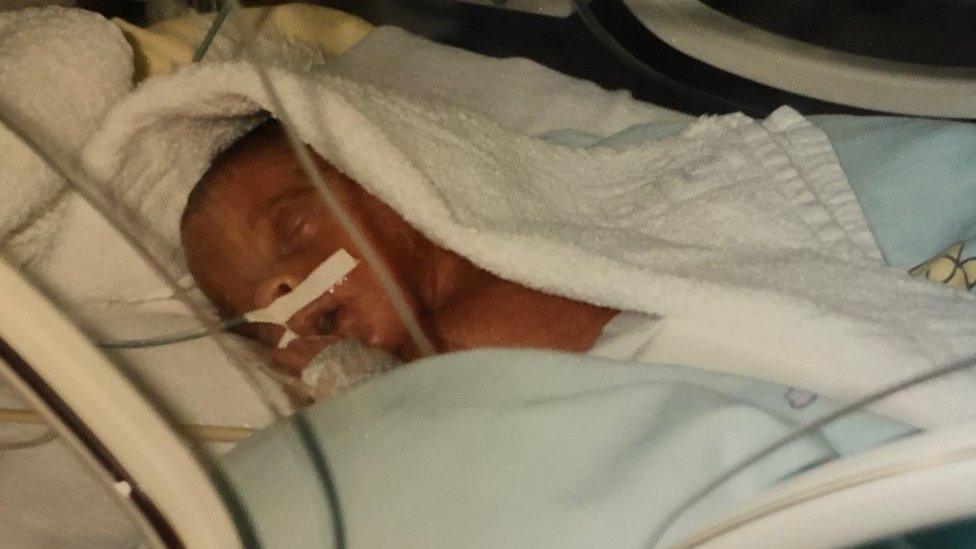
Maddy was born in Germany in 1997
I was born in Germany at 27 weeks, weighing less than a bag of sugar.
I was supposed to be born on 22 July but I arrived on 22 April and had a rocky start to life.
When I was born I had sepsis - which is why I was born so early - and a bleed on the brain resulted in me having cerebral palsy.
I was given a 25% survival rate and a day later my dad was told to plan for my funeral.
In the beginning I was on 100% pure oxygen because I couldn't breathe on my own.
The doctors in Germany were really good, they were amazing.
But when I was two, my parents took me to see a children's doctor and they basically said I'd never walk or talk and my parents would have a spastic child.
That's when they decided to move back to the UK.
'School didn't know what to do with me'
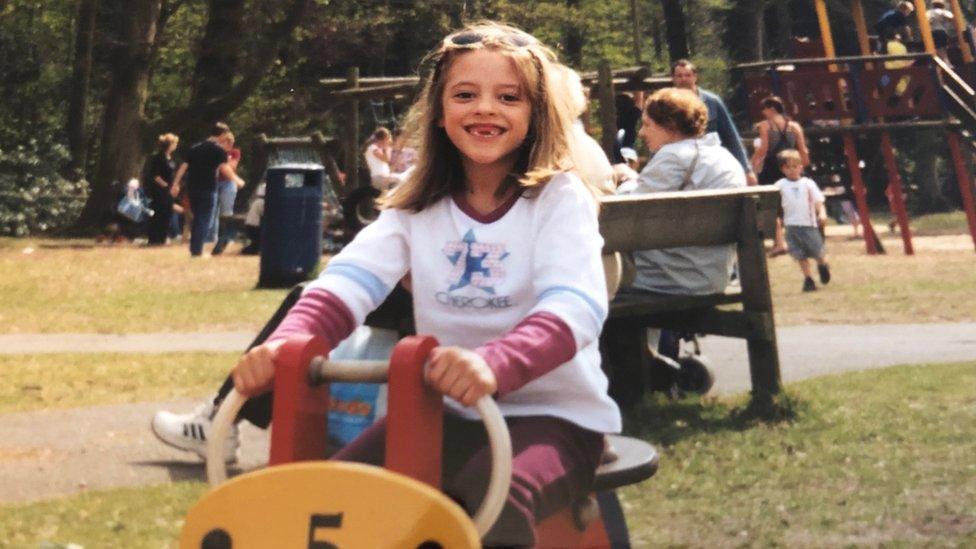
For Maddy, finding teachers and friends who understood her proved a challenge
I went to PACE which is a UK-registered charity and special school based in Aylesbury in Buckinghamshire.
It helps children and young people with motor disorders such as cerebral palsy and the people there helped me to walk and talk.
Then when I was four, I started primary school.
The head teacher at the time was really supportive but that was the school that didn't really know what to do with me.
It was here where joining in on sports day meant putting out bean bags and other equipment.
Then my support assistant left, the head left and another teacher told my parents that I'd never go to university.
My parents took me out of the school when I was eight or nine and I went to Beachborough Prep School in Northamptonshire.
That was the best school I've ever gone to and I was there for five years.
A change of school, where inclusion was high on the agenda, opened up a world of sport to me.
'I was dragged by my school tie in the rain'
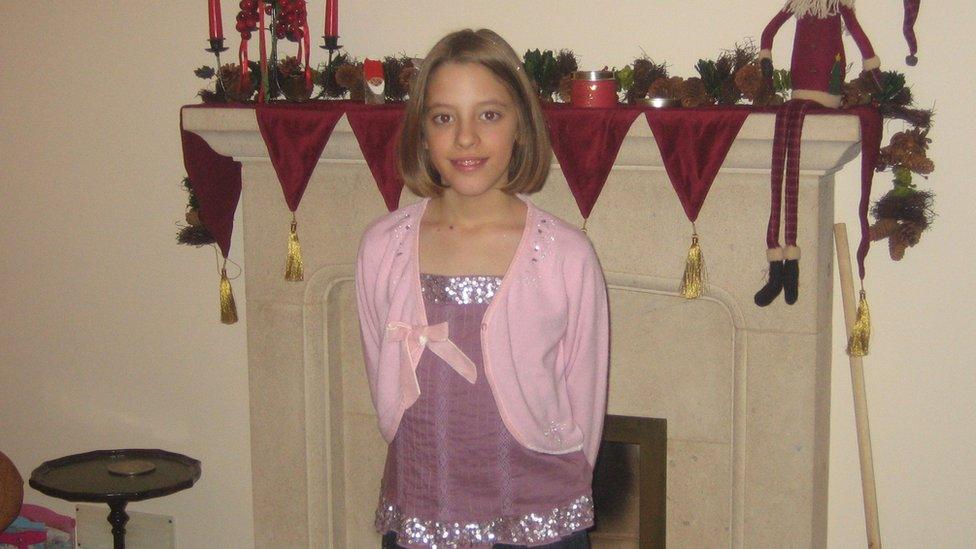
"Bullying was aimed at me for my disability"
At primary school, the other kids knew I was different and knew I had something wrong with me but I don't think any of us really understood and that was sort of OK.
When I went to Beachborough though, I obviously understood then. I did have some good friends who were really supportive but some were just horrible.
On one occasion, I had the whole of my games locker emptied and my games kit thrown all over the floor. I also had lies made up about me.
The bullying was aimed at my disability.
The one I mostly remember is this girl who had started when I was 11.
One Friday, after rehearsing the school play, she and and another girl decided to corner me outside when it was chucking down with rain and scream at me.
I tried to run but they got hold of me and dragged me by my tie. I managed to get away and saw the head girl who took me to my mum.
The two girls and their parents got called in. They were sitting on the floor crying, saying sorry. But you don't forget it.
A couple of years later, weeks before I was about to have major hip surgery, the same girl decided to imitate how I walked. I ran out of the room crying.
I had the operation and had to learn to walk again. It was just before my 13th birthday. I was home schooled for a month, before gradually going back to full time at school.
'My love of sport began'
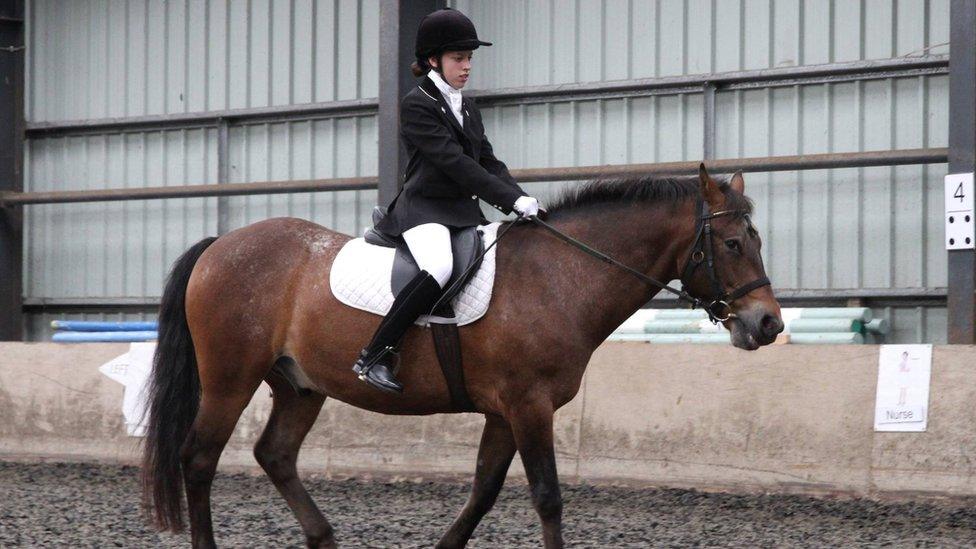
Maddy's love of sport truly began at secondary school in Devon
Despite some bullying at Beachborough, I did lots of sport including hockey, rounders and netball and went with friends on matches to different schools.
I started horse-riding when I was seven but it wasn't until I moved to Devon when I was 14 that I started competing in dressage regionally and nationally.
I did stuff like Ten Tors, external and the Duke of Edinburgh award while at Stover School.
My love of sport had begun.
Then in 2012, I saw Tom Daley win the bronze medal at the London 2012 Olympics.
He had a competition in Plymouth a year or so later so me and my friend went to meet him.
It was then, while watching where I thought 'I'll give this a go'.
It had taken me 10 years to learn how to swim a length of the pool. I wouldn't jump in off the side, I was so scared.
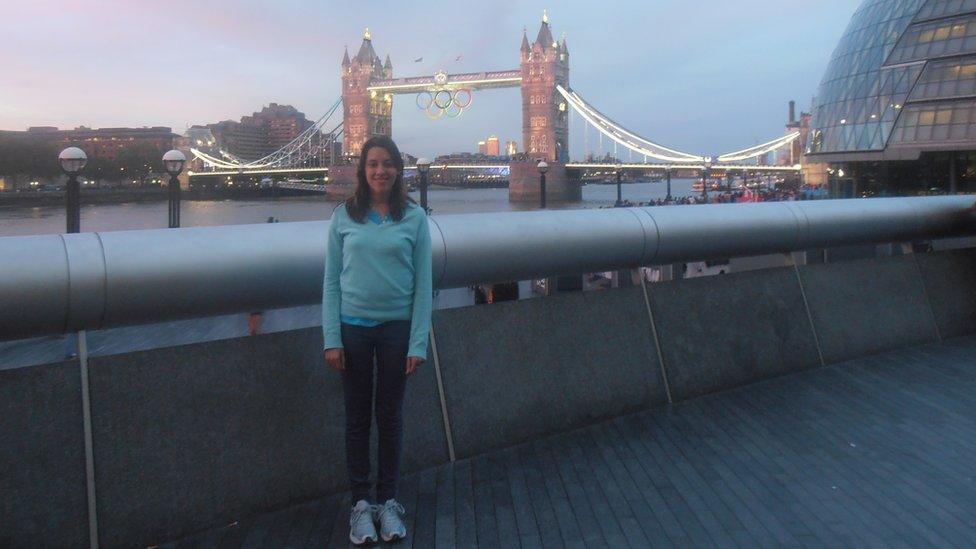
Tom Daley's 2012 Olympic bronze medal win inspired Maddy to take up diving
You may also like:
In September 2014, I started my A-levels and I did COPE - Certificate of Personal Effectiveness - a bit like life skills.
I was able to do my diving as part of that and complete targets. That was when I started to do it every week.
My coaches were great and got me doing tuck rolls off 1m and 3m boards.
I'm starting to try and jump off 5m before moving to 7m, my next target.
Whilst having lessons, I saw a local diver coaching and I thought that might be fun to do. I did the level-one course in June 2016 and started coaching in the September, when I started university.
I did the level two last June but I didn't pass because I didn't have that much confidence talking to people. But I now have a mentor and am constantly improving.
When I dive into the water, it can make me feel like I'm no different to anyone else. I can be like everyone else in the water.
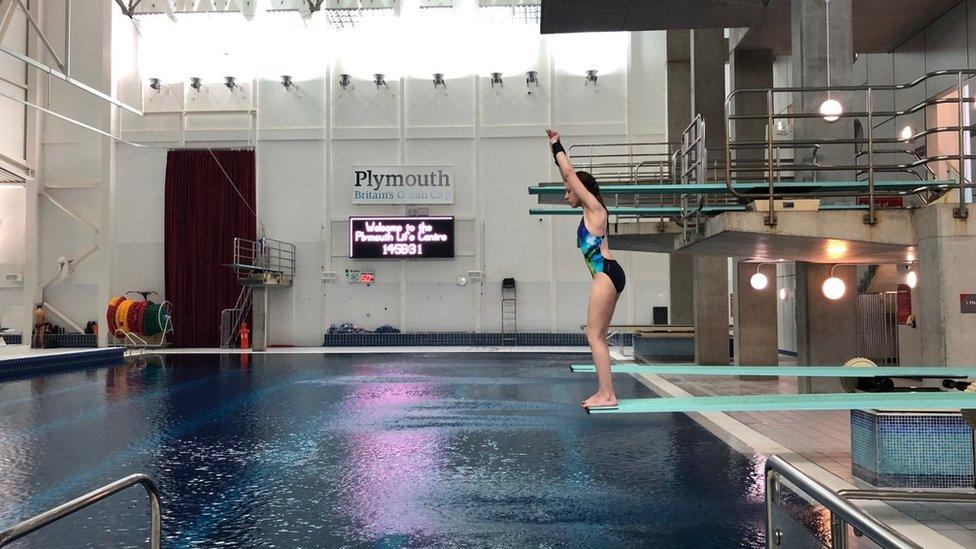
As well as diving herself, Maddy now coaches others
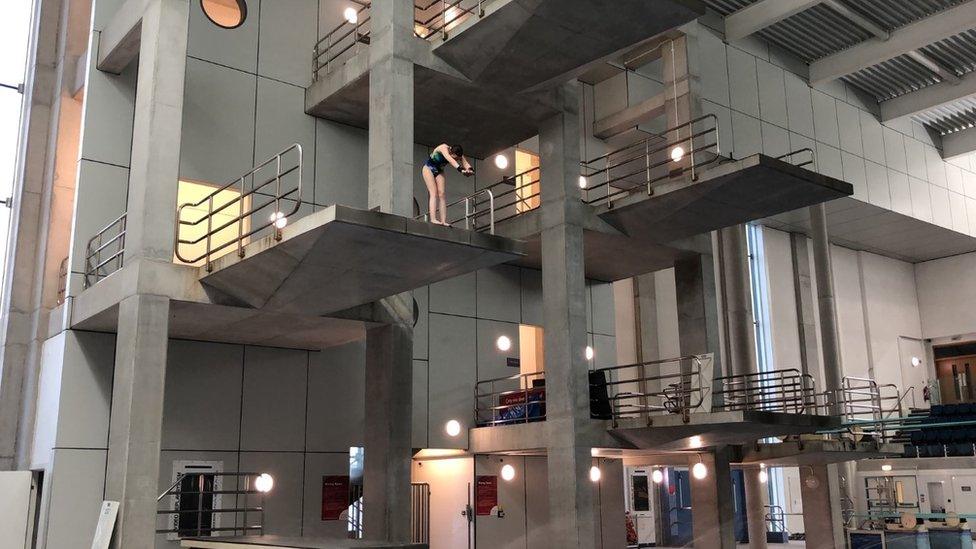
"When I dive into the water, it can make me feel like I'm no different to anyone else"
My aim is to try and get diving in the Paralympics. Southampton is the only place in the UK that does disability diving classes and I'm the only diving coach with cerebral palsy in the country.
I've had interest from California, Denmark and Australia to try and get disability diving on the agenda.
I really want to work in either Germany or Austria. In Germany, they have the International Paralympic Committee, which is where I'd really like to work.
We have a friend out in Austria who organises sporting events including ski shows.
He said he'd offer me a job if I learnt German, so that's what I'm doing now.
'University has made me more resilient'
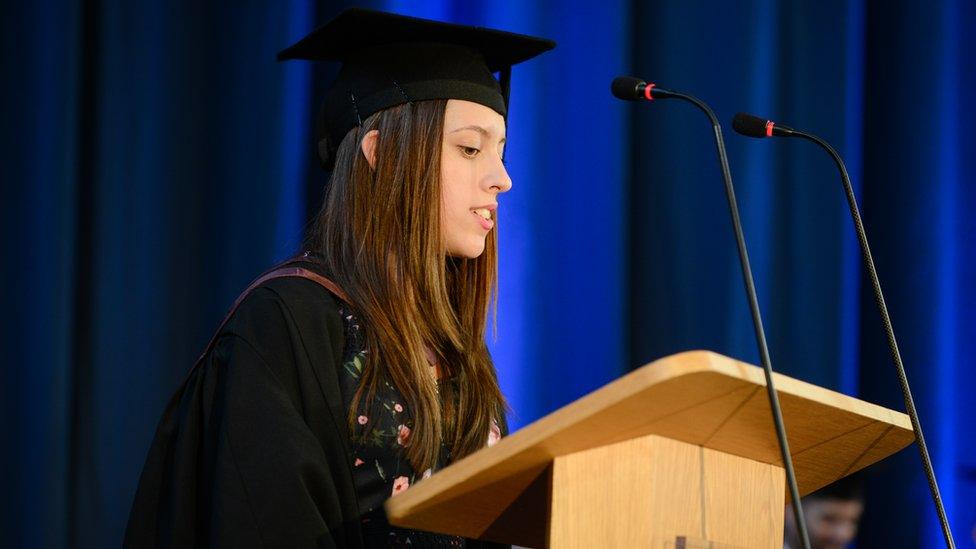
Maddy graduated from Plymouth's Marjon University with a degree in sport development
Getting into university was amazing.
It enabled me to achieve something I was led to believe was impossible for me.
Even at Stover, I didn't think they thought I could get A-levels or even GCSEs but I got through them.
If you can't do the exact same thing as others you can do it a different way. You can adapt to anything.
Diving and going to university have definitely been big moments in my life.
If I hadn't have gone, I wouldn't have had the confidence to be student speaker, something I was honoured to be asked to do.
Going to university has made me a more resilient person.
There have been highs and lows, all of which have taught me not to give in, and especially not to be beaten by disability.
My aim is to help people who deserve to have sport in their lives, but due to being born different or because of their living environment, have not been given the same opportunities as everyone else.
My own sporting journey is and will probably always be tough.
I hope I can make a difference in some small way to underprivileged and disabled people as well as pursuing my own personal challenges and dream of joining the Paralympic movement.
As told to Hayley Westcott

What is cerebral palsy?
Cerebral palsy is the name for a group of lifelong conditions that affect movement and co-ordination
It is caused by a problem with the brain that occurs before, during or soon after birth
Symptoms can include weak arms or legs, random, uncontrolled movements and walking on tiptoes
The severity of symptoms can vary and there is no cure but it can be managed by physiotherapy
Source: NHS Choices, external
